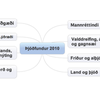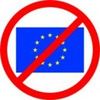What Rasmussen Should Say
6.4.2009 | 01:00
I apologize for allowing citizens freedom of speech and for not thinking it's a good idea to murder a human being for drawing a cartoon that I do not agree with.
How could Turkey respond to that?
GTB

|
Segja Fogh biđjast afsökunar |
| Tilkynna um óviđeigandi tengingu viđ frétt | |






 axelthor
axelthor
 gattin
gattin
 muggi69
muggi69
 rattati
rattati
 kreppukallinn
kreppukallinn
 fullvalda
fullvalda
Athugasemdir
Kallar ţú hatursáróđur málfrelsi?
Hilmar Gunnlaugsson, 6.4.2009 kl. 01:05
ég myndi allavega kalla skrípamynd málfrelsi.
Jóhannes H. Laxdal, 6.4.2009 kl. 01:56
Hilmar,
Here is the "hate speech" definition according to Wikipedia-
Hate speech is a term for speech intended to degrade a person or group of people based on their race, gender, age, ethnicity, nationality, religion, sexual orientation, gender identity, disability, language ability, ideology, social class, occupation, appearance, mental capacity, and any other distinction that might be considered by some as a liability.
You can imagine how difficult it would be to try and write a law about hate speech and how utterly impossible it would be to try and inforce it. I mean, what the hell can you talk about according to that definition. I guess that's why, at least where I come from, the courts have repeatedly overturned laws based on "hate speech".
It is not possible to have laws to protect people from being offended. That is what we are talking about here. Some Muslims felt offended by the images. Whether or not they were drawn out of hate is a matter of subjectivity and speculation. Western law has little tolerance for either.
GTB
Gregg Thomas Batson (IP-tala skráđ) 6.4.2009 kl. 01:59
Reyndar er haturáróđur hluti af tjáningarfrelsi einstaklinga. Ţćr hömlur sem settar eru á málfrelsi snúa ekki ađ ţví hvađ má og má ekki segja heldur hvort menn ţurfi ađ bera bótakröfu vegna orđa sinna.
Ţađ er engin laus ađ banna umrćđu, teikningar eđa annađ. Ef bođskapurinn er ofbeldi, hatur eđa annađ heimskulegt ţá tökum viđ bara ţá umrćđu og vinnum bug á hatrinu á ţann hátt. Bođ og bönn hafa aldrei leitt til neins góđs.
Landiđ (IP-tala skráđ) 6.4.2009 kl. 02:44
Ţessi lög hindra ekki málfrelsi heldur eru ţau fyrst og fremst til ađ vernda minnihlutahópa fyrir ofsóknum. Í flest öllum lýđrćđisríkjum er slík lagasetning nauđsynleg og hefđi ađ öllum líkindum hindrađ uppgang Hitlers á sínum hefđi hefđu lögin veriđ ţar í gildi.
Landiđ. Hatursáróđur er ólöglegur og hefur ekkert međ tjáningarfrelsi ađ gera frekar en ađ öskra "eldur" í kvikmyndahúsi.
Hilmar Gunnlaugsson, 6.4.2009 kl. 20:30
Hilmar,
Ok, now I guess we are going to need to define what a minority is. And we also are going to need someone to decide which group falls under that definiton and more importantly which group fall outside that definition. How is it going to be socially, morally, and legally possible to determine which speech can and cannot be used for which minority? And can you then say the same things if the group is a majority? I suppose in other "democracies" that have weaker court systems than that of the US and have no inherent right to free speech, "hate speech" laws are accepted, but these laws are still very difficult to enforce and have no practical purpose but to try and show the world how "good" we can be by enacting such s"socially uplifting" legislation. Do you think that because there is a law banning guns in England that there are no gun deaths in England? Marijuana is illegal in Iceland and that doesn't seem to stop people from growing it. Saying that Hilter could not rise to power if there were "hate speech" laws is just putting too much faith in your fellow human beings.
There is a great deal of difference between "offensive" speech and yelling "fire" in a crowded movie theater. The risk of injury or even death to the occupants of the theater panicked but someone yelling fire trumps the individual right to do so. This is a very basic foundation of law-Life trumps choice. Hence, governments can pass laws to limit rights or privleges if there is a risk of injuring another. Goverments can decide how fast you can drive and where you cannot smoke. And a person can sue another if their action caused injury or created damages. When someone uses speech which another finds to be "offensive" there is no risk of injury to that person. Where is that person's damages? What loss did that person endure? How do you quantify it? How is the person who had the speech directed at them a victim of anything criminal? These are the questions the court in the US ask when reviewing "hatespeech" laws and the answers to the questions is why the courts repeatedly overturn them.
GTB
Gregg Thomas Batson (IP-tala skráđ) 6.4.2009 kl. 23:01
Hilmar já ég tel hatursáróđur vera partur af tjáningafrelsi
Alexander Kristófer Gústafsson, 8.4.2009 kl. 02:48
Bćta viđ athugasemd [Innskráning]
Ekki er lengur hćgt ađ skrifa athugasemdir viđ fćrsluna, ţar sem tímamörk á athugasemdir eru liđin.